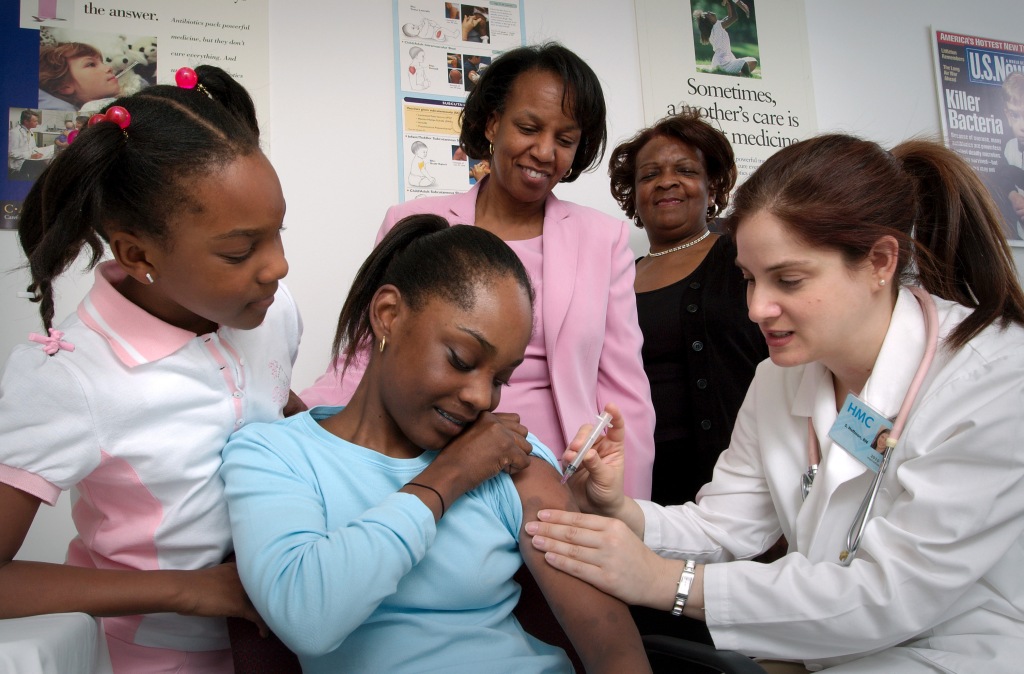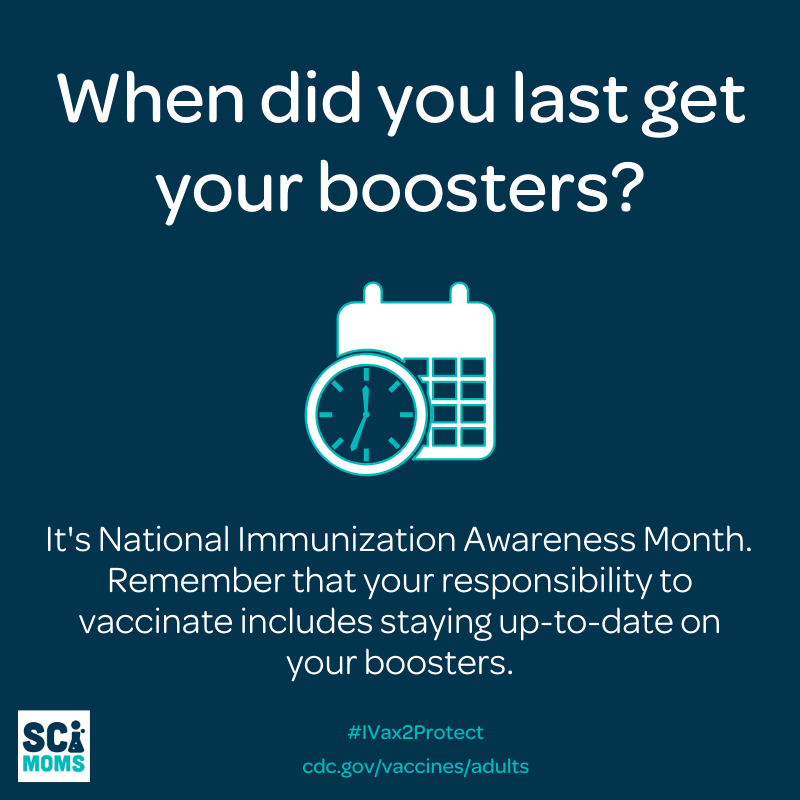The vaccine “debate” has been raging for two centuries but, for many in the anti-vaccine movement, this debate isn’t actually about vaccines at all. Vaccines have become a stand-in for a number of very real concerns. Who controls our healthcare system? Can we trust the government to ensure that our medications are safe? Who looks out for the marginalized?
We’re seeing lower vaccination rates and an increase in vaccine-preventable illnesses, not because so-called “anti-science” thinking is on the rise, but because we as a society are struggling for answers to these much deeper questions.
All of us at SciMoms vaccinated our children—some of us because we trusted the overwhelming body of evidence on vaccine efficacy, and others because we simply trusted our doctors. For us, the evidence is clear: the risk of not vaccinating is greater than the risk of vaccinating. But we know some parents will never accept that evidence, no matter how much of it there is. Why do these low vaccination rates persist? It turns out the answer is kind of complicated.

Who do you trust when it comes to vaccines?
For opponents of vaccination, distrust often begins with the pharmaceutical companies. This distrust isn’t entirely unfounded, as there are plenty of examples of pharmaceutical companies behaving unethically. For example, Merck released an anti-inflammatory drug over scientist concerns about increased cardiovascular risk. Firms like AstraZeneca and others financially rewarded physicians who served on FDA advisory panels and voted to approve their products. Mylan, the manufacturer of the Epi-pen, has spent years making small tweaks to their dispenser in order to maintain patent protection and charge exorbitantly high prices for this life-saving product.
When the scientific consensus benefits powerful entities with a history of putting profits before people, it makes sense that consensus will provoke debate. Unethical corporate behavior doesn’t invalidate the science but, unfortunately, it can do a lot of damage by eroding public trust. Evidence, no matter how much of it there is, will always fail to persuade without a foundation of trust.
The powerful appeal of anti-vaccine communities
Our friends and family often turn to us for advice about vaccines and, over time, we’ve seen just how small a role the actual evidence plays in personal decision-making. Our friends and family don’t turn to us because we have some special access to the evidence. They turn to us because we have a personal relationship. Quite simply, they trust us.
The most successful anti-vaccine advocates work hard at building that same kind of trust. Usually, they aim to fill a void sometimes left by the conventional healthcare system. They seem to have a constant social media presence, despite their small operations, and that can be an important source of comfort and community for parents who are struggling.
Successful anti-vaccine advocates often forge a personal connection with their followers, sometimes beginning with content totally unrelated to vaccines. That’s a tactical choice. These personalities draw followers in with unrelated feel-good posts and then, over time, bring them over to their side of the anti-vaccine debate by slowly spoon feeding them misinformation.
The anti-vaccine movement offers the illusion of control when healthcare has no answers
Parents of children with chronic disease or other serious health issues are especially vulnerable to the anti-vaccine movement. You already feel outside the medical norm, so even though you’ve heard that the scientific consensus on vaccines points to a record of safety, it’s easy to question whether that applies to your family with its unique healthcare needs.
You might even feel at odds with the doctors responsible for your child’s care. When physicians give you answers that you don’t like, or you get a doctor who doesn’t treat you with respect, it can make you feel ignored and belittled, like no one cares about what you and your family are going through.
That’s the void the anti-vaccine movement looks to fill. They offer everything the medical healthcare system can’t: a tight knit community of parents who sympathize and often empathize with what you’re going through. For people who may have slipped through the cracks of the medical healthcare system, it’s a compelling source of emotional support.
Sadly, that emotional support often turns into something far more dangerous. Many anti-vaccine personalities blame a wide range of health conditions on vaccines. Their blame is misplaced and wrong but, for parents who feel like they aren’t getting clear answers from their doctors, the blame can feel like a relief. Anti-vaccine personalities offer concrete advice, like try this diet or that herbal remedy, giving parents a comforting sense of control. That control, of course, is illusory, because the advice is inaccurate and often dangerous. Many parents only come to leave the anti-vaccine movement when they see these dangers play out for themselves, sometimes in their own families.
So why should we vaccinate?
If vaccine manufacturers have been corrupt, if the healthcare system sometimes fails, and if pharmaceutical companies put profits over patients, you might be wondering, why should parents vaccinate? We could write endless screeds about the overwhelming scientific consensus on vaccines but, to put it simply: vaccines are an effective and low-risk method of preventing harmful diseases.
The choice not to vaccinate is ultimately a misassessment of risk. As parents, we often worry more about the small risks while ignoring the more prominent ones right in front of us. Even though the studies supporting the consensus on the safety and efficacy of vaccines have been generated by public, private, and government researchers, vaccine-questioning parents still worry. They’re more worried about the infinitesimal risk from a vaccine than the more serious risks presented by the disease themselves.
Worse, some parents may lean towards believing the data but think “My kid doesn’t need vaccines” or “I’d better wait till my child is older.” Here’s what these parents may be missing: there are important reasons to vaccinate that have nothing to do with the health of your own kid.
The most compelling reason to vaccinate is not to protect your healthy, thriving kid, actually, but to protect the most vulnerable populations. Low vaccination rates hit vulnerable groups the hardest. These groups include low-income families, the elderly, the very young, and immunodeficient individuals. Additionally, myths and misinformation surrounding vaccinations continue to harm autistic people and their families.
Low vaccination rates impact the most vulnerable in our communities
“When I was young, we all got chickenpox. I don’t know why we need a vaccine for it.”
“Measles are pretty harmless. It’s better to just get it naturally and be over with it.”
Let’s put aside the statistics and science for a moment and consider these statements. A parent of a healthy child is willing to expose others to a disease just because they’re certain their own child can survive it. The decision not to vaccinate endangers the immunocompromised, cancer patients, and those with asthma or other risk factors. These vulnerable populations are counting on the absence of the virus in our population to stay healthy.
When there are disease outbreaks, every outing increases the risk of contracting a disease, even more so when herd immunity is failing. One, of course, could argue that there are thousands of viruses that could harm these individuals, above and beyond vaccine-preventable illnesses, and that’s true. However, vaccines are one of the most effective ways of decreasing risk for these populations. That’s why the SciMoms do not view the increasing number of vaccines as a burden that our families have to tolerate but, instead, as a way to protect the most vulnerable in our communities.
Low vaccination rates impact low-income families
When a parent of financial means chooses not to vaccinate their child, often they do so knowing they have good insurance and can afford treatment for something like measles. They have sick days and vacation leave, so they can stay at home to care for their child. But for parents who don’t have these resources, low vaccination rates and increases in vaccine-preventable diseases have a much more significant impact.
In 2016, the economic burden of vaccine-preventable diseases was placed at $9 billion, which highlights the stress that these diseases can place on the healthcare system and families. A study published in 2016 found that influenza resulting in hospitalization occurs more frequently in impoverished neighborhoods. The authors of the study attributed this disproportionate impact on “[c]rowded living conditions and a higher prevalence of other medical conditions.”
Misinformation about vaccines impact autistics and their families
Few topics have been as thoroughly examined as the false link between autism and vaccines. The origin of this myth in the anti-vaccine debate is an unethical medical doctor who altered medical records and subsequently lost his medical license. Even though his false claims have now been disproven dozens of times in studies involving as many as 1.2 million children, the harm has already been done. The myth of a link between autism and vaccines is one of the most persistent in the anti-vaccine community, promoted by alternative medicine providers like chiropractors and acupuncturists, celebrities and even presidential candidates like Jill Stein and Marianne Williamson.
The consequence of the anti-vaccine movement is that valuable resources continue to be spent readdressing this myth, when they would be much better spent understanding autism and building spaces and communities where autistic people are accepted. The vaccine/autism myth leads to the false and harmful notion that autistic children are “damaged” or that they could have been “spared” or “cured.” The same anti-vaccine individuals who promote the idea that vaccine injuries can be detoxed or purged also promote harmful autism “remedies.”
Vaccination: It’s Not About You
Most opponents of vaccines aren’t anti-science, at least not exactly. They reject the consensus of evidence, as thorough and comprehensive as it is, because they’ve lost trust in the institutions responsible for ensuring vaccine safety. What’s challenging about this narrative is that pharmaceutical companies do care about profits and sometimes do behave unethically, but at the same time, independently funded research shows these vaccines to be very, very low-risk.
To be clear, all of the SciMoms take issue with the pharmaceutical industry and the healthcare system. It’s unsettling to know that the healthcare system discriminates against women, non-white people, those of lower socioeconomic status, and other marginalized individuals.
Rather than debate just how low of a risk vaccines pose, however, we’d rather focus on the risk that the anti-vaccine movement and opting out of vaccination can pose to our most vulnerable communities. Not only does opting out put our own families at risk, it puts the health of the most vulnerable members of our communities at risk. That’s why it’s especially important that all of us with insurance or other means to pay for and access vaccines make sure we vaccinate our kids and stay up-to-date on our own vaccines.

Layla discloses that she is currently employed by a pharmaceutical manufacturer. Her contributions in writing this article are hers alone, and do not reflect the views/opinions of her employer. For more about the SciMoms funding, please see this page.


You must be logged in to post a comment.